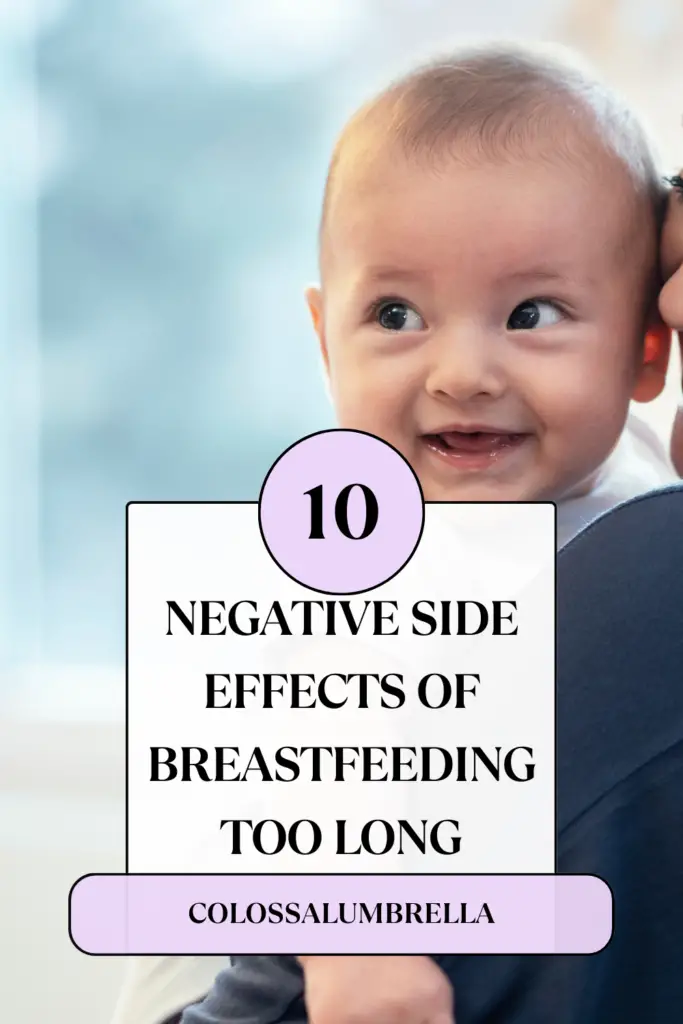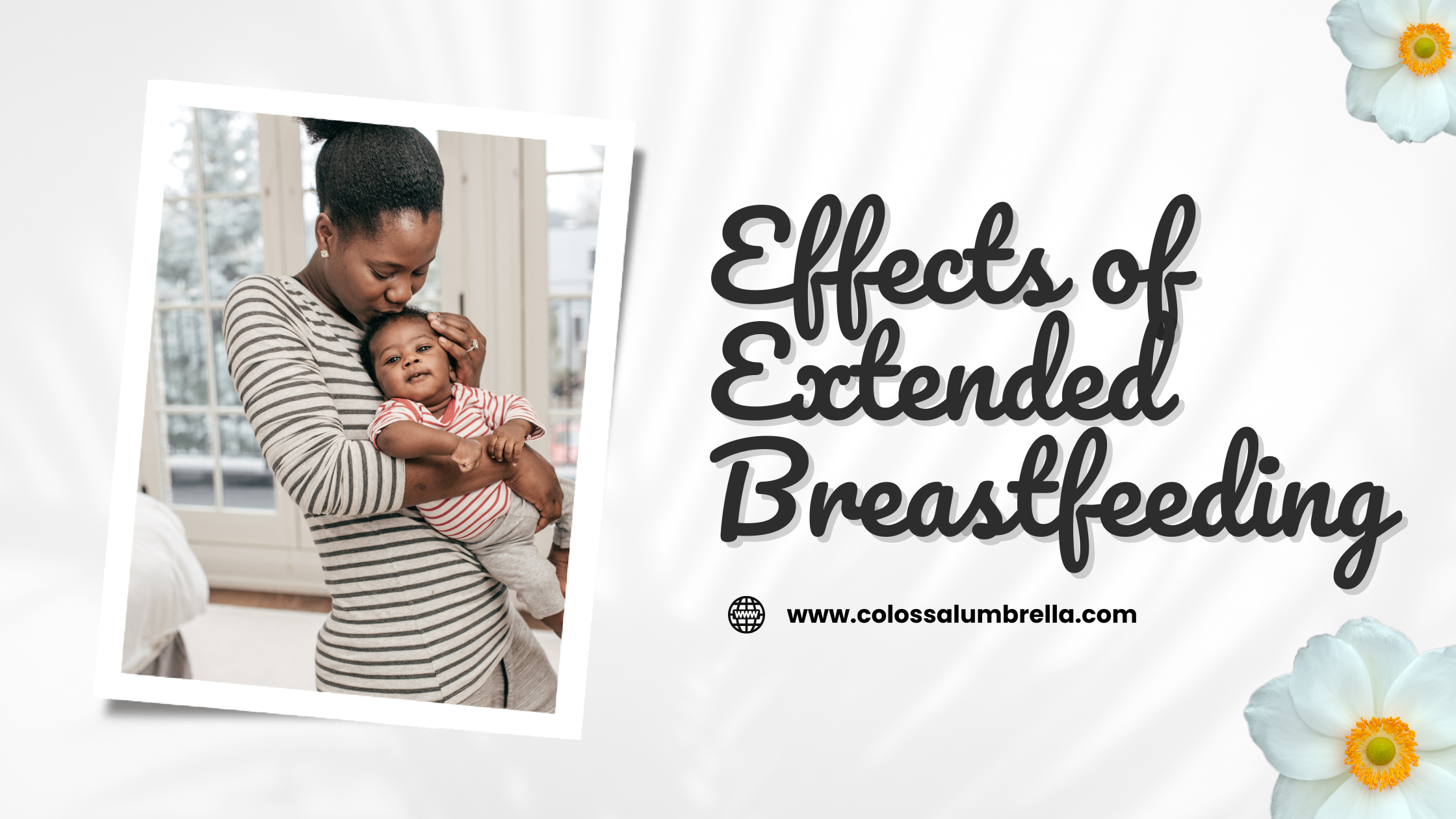Contents
If there’s one thing that brings us all together, it’s the unwavering love and dedication we have for our little ones. And when it comes to providing the best, breast milk often takes priority. We’ve all heard about the incredible benefits of breastfeeding, the bonding, the nutrients, the immunity boost – the list goes on. But what about negative side effects of breastfeeding too long?
It is only fair that we shed some light on the potential downsides that can come with extended breastfeeding. In this post, we’ll be getting real about the negative side effects that can sometimes tag along when breastfeeding becomes an extended affair.
Understanding Extended Breastfeeding
Extended breastfeeding refers to the practice of nursing a child beyond the age that is considered typical or culturally acceptable in a given society. The definition of extended breastfeeding varies across cultures, but in the United States, it generally means breastfeeding beyond 12 months. According to the Centers for Disease Control and Prevention (CDC), approximately 36% of babies in the U.S. are still breastfeeding at 12 months, and about 15% are breastfeeding at 18 months.
The Benefits of Extended Breastfeeding
Extended breastfeeding, also known as prolonged breastfeeding, refers to the practice of continuing to breastfeed a child beyond the first year of life, typically into the toddler and even preschool years. While cultural norms and individual preferences vary, there are several potential benefits associated with extended breastfeeding:
- Nutritional Benefits: Breast milk remains a highly nutritious source of essential nutrients, vitamins, and minerals as a child grows. It continues to provide the child with a balanced and easily digestible source of nutrition that adapts to their changing needs.
- Immune System Support: Breast milk contains antibodies and immune-boosting properties that can help protect the child from infections, illnesses, and allergies. This is particularly beneficial during the toddler years when children are more exposed to various pathogens.
- Brain Development: Breast milk contains essential fatty acids, such as DHA, which are crucial for brain development. These nutrients can continue to support cognitive and neurological development as the child grows.
- Emotional Bonding: Extended breastfeeding can contribute to a strong emotional bond between the mother and child. The physical closeness and comfort provided by breastfeeding can help nurture a sense of security and attachment.
- Physical Health: Research suggests that extended breastfeeding may offer protection against certain chronic diseases, such as obesity, type 1 diabetes, and certain types of cancer. The exact mechanisms behind these potential protective effects are still being studied.
- Nutrition Transition: Extended breastfeeding can ease the transition to solid foods, as breast milk provides a familiar and nourishing source of nutrition while the child explores new tastes and textures.
- Comfort and Soothing: Breastfeeding can serve as a source of comfort and soothing for a toddler or preschooler, helping them navigate emotional challenges, anxiety, or stress.
- Convenience and Cost Savings: Extended breastfeeding can be convenient for both mother and child, eliminating the need for formula preparation and reducing the expense associated with purchasing infant formula.
- Environmental Benefits: Extended breastfeeding can contribute to a reduced carbon footprint by reducing the demand for formula production and packaging.
- Natural Weaning: Extended breastfeeding allows for a more gradual and natural weaning process. The child can gradually reduce breastfeeding sessions on their own terms, leading to a smoother transition to a diet without breast milk.
Knowing When to Stop Breastfeeding
Deciding when to stop breastfeeding is a personal decision that should be based on the needs and well-being of both the nursing parent and the child. While recommendations from organizations like the American Academy of Pediatrics and the World Health Organization suggest breastfeeding until at least 1 to 2 years of age, it’s important for nursing parents to assess their own situation and consider factors such as the child’s development, the nursing parent’s physical and emotional well-being, and the dynamics of their family.

Professional Guidance
If a nursing parent is considering weaning or facing challenges with extended breastfeeding, seeking support and guidance from healthcare professionals, lactation consultants, or breastfeeding support groups can be beneficial. These resources can provide personalized advice, practical tips, and emotional support to help nursing parents navigate the challenges of extended breastfeeding and make informed decisions.
10 Negative Side Effects of Breastfeeding Too Long
Breastfeeding is generally considered to have numerous health benefits for both the baby and the mother. However, like any other aspect of parenting and healthcare, there can be potential negative side effects associated with breastfeeding for an extended period of time. It’s important to note that individual experiences can vary, and what might be considered a “too long” duration of breastfeeding can differ based on cultural norms, personal preferences, and medical circumstances. Here are some potential negative side effects to consider:
- Nutritional Inadequacy: Breast milk alone may not provide sufficient nutrients as a child grows, potentially leading to deficiencies.
- Dental Issues: Prolonged breastfeeding, especially during sleep, could contribute to tooth decay in infants and toddlers.
- Dependency and Weaning Challenges: Extended breastfeeding might lead to emotional dependency and make weaning more difficult.
- Delayed Speech Development: Excessive breastfeeding might reduce time spent practicing verbal communication, potentially leading to delayed speech development.
- Social Challenges: Extended breastfeeding might lead to discomfort or negative reactions from others, impacting the child’s social interactions.
- Increased Risk of Allergies: Prolonged breastfeeding could potentially increase the risk of certain allergies in the long term.
- Hormonal Changes in Mother: Extended breastfeeding might lead to hormonal changes in the mother’s body, affecting her menstrual cycle and overall health.
- Mother’s Nutritional Status: Prolonged breastfeeding without a balanced diet could compromise the mother’s own health.
- Impact on Family Planning: Extended breastfeeding might affect a mother’s ability to resume regular menstrual cycles and plan for future pregnancies.
- Emotional and Psychological Impact: Both mother and child might face emotional challenges related to extended breastfeeding, affecting their overall well-being.
People Also Ask
Is breastfeeding after 2 years harmful for mother?
Breastfeeding beyond 2 years usually isn’t harmful for most mothers, but individual situations can differ.
At what age is breastfeeding no longer beneficial?
Breastfeeding can remain beneficial beyond infancy, but individual needs vary. Generally, exclusive breastfeeding may not suffice beyond 6 months.
Can breastfeeding too long cause problems?
Yes, extended breastfeeding can lead to potential issues such as nutritional inadequacy, dependency, and delayed speech development.
Conclusion
Extended breastfeeding can offer numerous benefits for both the nursing parent and the child. However, it is important to be aware of the potential negative side effects that can arise from breastfeeding for an extended period of time. Cultural stigma, lack of support, time and effort, physical discomfort, inconvenience, impact on fertility, overattachment, and criticism are among the challenges that nursing parents may face. By acknowledging these challenges and seeking support and guidance when needed, nursing parents can make informed decisions that prioritize their own well-being and the well-being of their child.
Disclaimer: The content of this blog is for informational purposes only and is not intended to be a substitute for professional medical advice, diagnosis, or treatment. Always seek the advice of your physician or other qualified healthcare providers with any questions you may have regarding a medical condition.
I would stay connected and keep you updated with parenting tips, pregnancy guides, creative ideas, easy crafts, and Free Printables. Subscribe to Colossalumbrella to get new ideas delivered to your inbox. Follow me on Facebook, Pinterest, Twitter, and Instagram.
